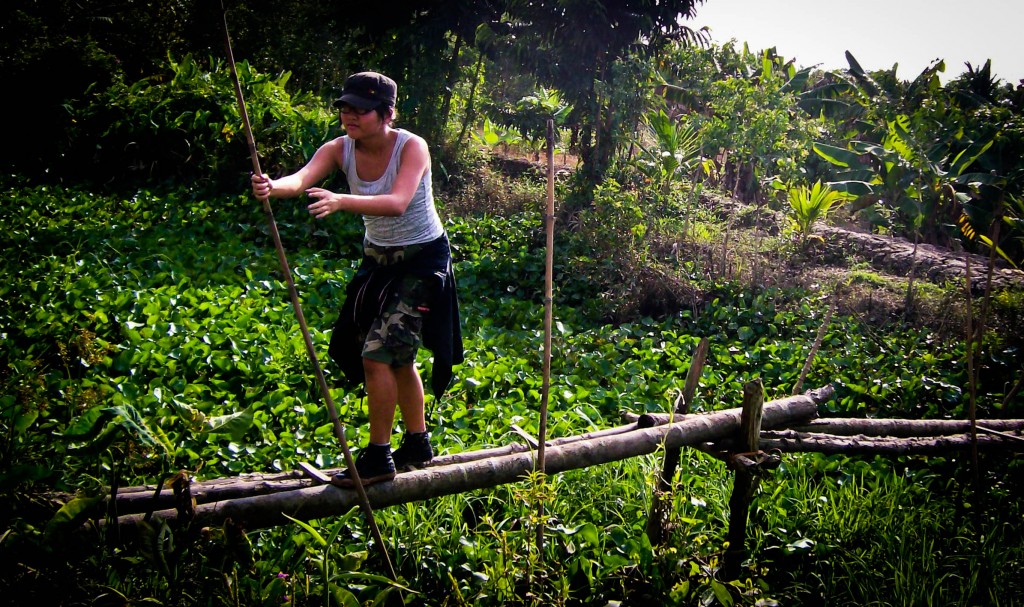7 months ago I wrote the post ‘Goodbye Classroom, Hello World!’ because I was taking a break from teaching in order to travel. Now I reflect on the profession that I have temporarily left behind.
I became an International School teacher in 2007 when I moved to Vietnam to teach English. Before I begin I’d like to clear something up. I am not a TEFL teacher. I have nothing against TEFL teachers -I have been one in the past – but I am not one now. I help students who already speak English fluently to improve, just as I would in the UK.
The International School that I worked in was a prestigious private school in Vietnam where many of the students receive top grades and continue their education in the best universities in the UK, Europe or the US. Each of my classes contained students from many different nationalities.
Life in an International school is challenging and intense, but great fun.
Students at International schools expect to work hard – they like being challenged. Parents expect teachers to work hard, and management expects results. It is not an easy ride: lessons have to be thoroughly planned, homework has to be challenging and papers have to be graded, with extensive comments. A-Grade students will constantly ask you how to improve. Parents of B-Grade students will tell you it’s not good enough, imploring you to set extra tasks. As with any teaching job the paperwork, admin and politics can drive you to insanity.
But the time spent in the classroom is incredible.
It is hard not to enjoy yourself when surrounded by enthusiastic, keen and motivated students. They are curious about the world that they live in and they have not yet become cynical. When you teach English Literature, as I do, you can discuss the important issues in our world: love, war, poverty, crime, happiness, tragedy, pain, death, the afterlife, religion, politics, spiritualism and everything in between. When you teach students from all around the world you have a wealth of backgrounds and experiences at your fingertips. You learn to expect the unexpected.

Teaching internationally makes you aware of things that you’ve never considered before: a student who doesn’t understand the symbolism of the name Snowball in ‘Animal Farm‘ because they’ve never seen snow, let alone a snowball. How would they know that it disintegrates easily under pressure, much like the character Snowball in Orwell’s classic? What about an 18 year old who doesn’t know what John Keats is referring to in his beautiful ode ‘To Autumn’ because they’ve only learnt the word ‘fall’ to describe the season that follows summer? Or a class full of students who think that Wordsworth is lamenting the death of his house cleaner when he mourns his ‘fair maid’? And don’t even consider using the phrase ‘make out’ to a class full of students mainly familiar with American English if you don’t want uncontrollable giggling for the rest of your lesson! What happens when you lose a group of students on an International Award (Duke of Edinburgh) expedition when they can’t follow the instruction ‘turn right on the tarmac road’ because they have no idea what tarmac is?

Teaching internationally opens up the world to both teacher and student.
I have had students tell me what life in Afghanistan under a Taliban regime is like, or how their parents escaped war-torn Vietnam by spending weeks at sea in a tiny, overcrowded boat. I have spoken at length to teenagers who believe wholeheartedly that you should never question authority because those in power are never wrong. I have seen students challenge their own thoughts and prejudices. And I have had students who have forced me to challenge mine.
Teaching at an International school exposes you to students who are willing to get up and have a go. An assembly at an International school is a vibrant and colourful affair with students desperate to participate and show off their skills. Sports Day is a competitive event where everybody wants to win. Students support and encourage each other and cultural differences are to be celebrated rather than mocked.
Check out these photos from International Day, a day when every classroom is decorated in the style of a different country, complete with local food, games and information about the culture:




Teachers at International schools are generally less stressed. Not because the job is easier because it’s not. But the teaching is fun and that makes a big difference. Teachers who are less stressed are more interested in getting out, exploring and having fun – so an International school often comes with a ready-made social life! And when you have a lot of marking you can take it to a beautiful beach (hey, if you’ve got to spend the weekend marking then at least do it overlooking the sea).
Teaching English in an International School is the perfect vocation to satiate wanderlust, both inside and outside of the classroom. What better place to discuss people, places and cultures that in a room full of excited students from all over the world?!
Who says you can’t combine work and travel?





Loved this post and the pictures! I am teaching in the States now, and I love it, but have always been interested in expat life. I was looking into international schools, but I’m not entirely sure where to start. Can you give me some resources and tell me how you found your school? I would appreciate it so much!
Thanks! Erin
Hi Erin. Great to hear from you. The school I worked in advertises through the Times Educational Supplement which you can find online at http://www.tes.co.uk December through to April is the main time for International schools to advertise so there should be plenty of jobs up now. You could also try a CIS Recruitment fair, check out http://www.cois.org for more information. There should be some fairs coming up soon so you might be able to get to one! Do you have any thoughts about where you’d like to go? Let me know how you get on
The teacher is the one who imparts wisdom. A child learns more from a teacher than at home and thus what a teacher is, is more important than what he teaches. Children look forward to them as their role models. And owing to the prestige associated with the international schools such as Cognita school, the expectations from teachers are even higher.
A very true statement, and a somewhat humbling thought for the teacher. I find that often parents look to teachers for advice outside of academic issues too, I have had parents of difficult children ask me how they can control their children because they run wild at home. As I don’t have children of my own, this is a difficult question to answer. The children behave in my class because I have the authority of the school and Principal behind me. It’s hard to know how to tell a parent how to be the authority in their own house.
Thanks for commenting.
Hi Elaine!
Enjoyed reading your blog. I am currently on a work placement in an international school in Jakarta. I was wondering whether you could help me out with some information. I am writing a dissertation on how English literature is taught in an international setting. I saw the issue of conveying symbolism to students with you example from animal farm. Could you give me some more information on how you teach literature.
Any help would be greatly appreciated.
Thanks,
Fiona
Fiona recently posted..Brussels is Best in Summer…
Hi runawaybrit,
It’d be great to get your insite into how much work a teacher on the international circuit does compared to a public school in the UK; I’m currently training to be teacher but am really wondering if it is for me. Is the workload in a secondary school lots? Like how many hours you reckon a week?
Any help would be really appreciated, s I dunno whether or not to bite the bullet and be sir or not!!
This is really great article. Thanks for sharing such a great article.
Thanks for sharing such a great article. Keep writing this kind of article.
This is an amazing article. Keep on sharing such wonderful life experiences.
Being teacher is a wonderful thing someone can experience in his life. Thanks for sharing such wonderful thoughts.
Teachers are those who make child knowledgeable and cultured. A teacher is such an important part in the life of a student, who through his knowledge, patience and love gives a strong shape to student’s whole life.
Thanks for sharing such a great article.